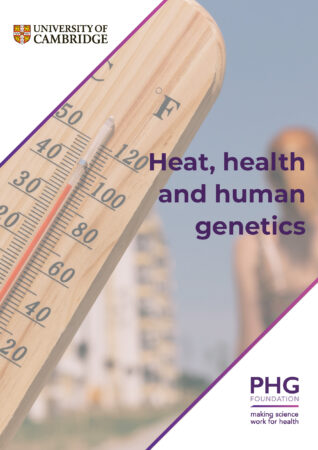Home Publications Reports Heat, health and human genetics
Heat, health and human genetics
Chantal Babb de Villiers, lead author of the report, is equal co-contributor on A genomic perspective on climate change, a letter from the joint coordinators of a workshop at the European Society of Human Genetics Conference 2023, published on ebiomedicine.
Heat, health and human genetics, sets out the current state of the science in relation to the potential impact of climate change on human health.
It describes the landscape of current evidence on heat-related health risks, the known physiological factors and known genetic factors that influence heat response, and the potential applications of genetic information to help manage the health burden associated with a warming climate.
Heat, health and human genetics will be of interest to policymakers and professionals from a broad range of disciplines including physiology, sports science, climate change, and genomics.
Climate change has resulted in an increase of extreme heat across the world, with heatwaves becoming a more common occurrence. This heat is having a profound affect on human health. The long term effects of heat on health are not well understood but interest and research in the area are growing.
Maintaining the body’s temperature (thermoregulation) is essential to the healthy functioning of the human body. It is a function involving several biological processes. In our investigation of the research landscape, we found little research into the genetics underlying this complex function.
A programme of research from different disciplines – a programme that includes genetics and genomic investigation – could deliver important insight in human thermoregulation and the impact of environmental heat exposure.
We are keen to develop the conversation and work with colleagues from across the many disciplines exploring this important field of research. If you have insights or ideas for potential collaborations, email us at [email protected]

